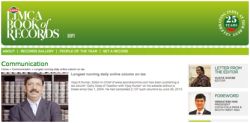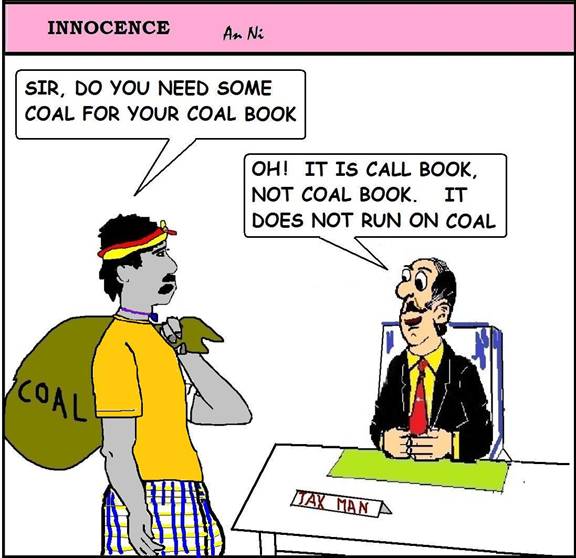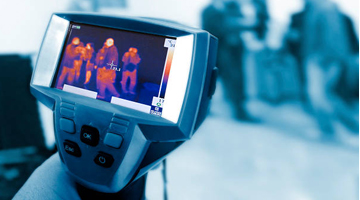
28.04.2014
Monday
A Commissioner of Central Excise belonging to a Scheduled Caste applied for the post of Member of CESTAT and was not selected and he approached the Central Administrative Tribunal (CAT) for a direction that he should have been considered for the job under the reserved category.
The CAT rejected his plea and observed that the selection was done by a Committee chaired by a Sitting Judge of the Supreme Court of India and that there was no reservation policy made applicable to the appointments to CESTAT. The CAT has also noted that the applicant participated in the selection process without any protest or demur and thereby took his chance to partake the selection process with full knowledge that his candidature was not being considered against any reserved post. Merely because, the Petitioner failed to get selected, he cannot turn around and challenge the selection process.
The Commissioner by now retired took the matter to the High Court.
The High Court last week in a judgement, found no infirmity in the CAT order to warrant interference by the High Court.
In recent times there has been some debate on reservation of post in the higher judiciary and there was lot of action in the judicial corridors of Tamil Nadu. Even the immediate past Chief Justice of India, Justice Sathasivam has advocated some sort of reservation for SC/ST/OBC in appointments to the high courts and the Supreme Court.
Even though there is no official reservation as such, there is some unwritten, informal reservation by which a few selected judges belong to the categories of SC/ST/OBC/minorities/women. One of the longest serving Chief Justices of India was from the SC community.
CESTAT, in its more than three decades of existence, had hardly two or three Members from the SC/ST communities. But then nobody looked at it that way. Caste or religion was never a factor in the CESTAT. In fact we had a Muslim Member who wrote in a judgement, The mere entry ‘Prasad' or ‘Prasadam' which is purely a religious offering made to the deity cannot be brought within the ambit of the Act. The mere specification in the tariff schedule will not make the item goods and exigible; merely because the devotee has purchased it from the temple precincts it cannot be considered as an exigible commodity. The item may be goods before they are taken for presentation to the deity and at that stage the excisability of the product could be considered. The said item before presentation to the deity would not be ‘Prasad' or ‘Prasadam' but it would be known in the stage in which it is. Therefore, the item, after it is presented to the deity by the temple authorities and offered to devotees on charges, cannot be considered as ‘goods'.
Obviously not many officers belonging to these communities apply for these jobs and so not many get selected.
The National Commission for Scheduled Castes had recommended a 50% reservation in all vacancies in the Supreme Court and High Courts till 22.5% reservation is achieved for SC/ST.
It had also recommended that for appointments to Tribunals, suitable provision has to be made for reservation for SC/ST candidates.
Any way as of now, there is no reservation and the disappointed Commissioner may not go to the Supreme Court as even if he had been appointed a Member of the CESTAT, he would have retired next month even from the CESTAT!
Please see 2014-TIOL-581-HC-MUM-MISC
CESTAT - Direct Appeal to Supreme Court - Why?
AS per Section 35G of the Central Excise Act, an appeal lies to the High Court from every order passed by the CESTAT, except an order, among other things, relating to classification (rate of duty) or valuation.
As per Section 35L, an appeal shall lie to the Supreme Court from an order passed by CESTAT among other things, relating to classification (rate of duty) or valuation.
Similar provisions are applicable for Customs and Service Tax.
This means that even if valuation or Classification is one of the issues among many other issues, the appeal from an order of the CESTAT lies to the Supreme Court and the High Court is barred from appellate jurisdiction. It is another matter that the Writ jurisdiction of the High Court cannot be taken away by any law.
Way back in 1982, when the Tribunal (called CEGAT then) was established, classification and valuation were hot issues and of course having All-India effect. As per Section 35D(2), as it then existed, appeals to the Tribunal from orders of the Commissioners, relating to, among other things, classification or valuation, had to be heard by a Special Bench of the Tribunal consisting of three members and the Special Bench had all India jurisdiction. Appeals from these Special Benches, which were dealing with classification/valuation matters, were to lie to the Supreme Court. This was a substantive right of the appellant irrespective of whether a question of Law or a question of fact was involved.
Over the years, Classification and valuation lost their importance in litigation and the Special Benches of the Tribunal were abolished in 1995 and now all Benches of the CESTAT can hear matters relating to Classification and Valuation. When the Special Benches were abolished, there was no reason to continue direct appeals to the Supreme Court on classification/valuation matters. But somebody forgot to make the changes and we are stuck with this system and all matters relating to classification/valuation are still going straight to Supreme Court from the Tribunal.
The Chandra Kumar Effect: In a landmark case, L. Chandra Kumar v. Union of India - 2002-TIOL-159-SC-CB, a Constitutional Bench of the Supreme Court held,
1. We hold that all decisions of Tribunals whether created pursuant to Article 323A or Article 323 B of the Constitution, will be subject to the High Court's Writ jurisdiction under Article 226/ Article 227 of the Constitution, before a Division Bench of the High Court within whose territorial jurisdiction the particular Tribunal falls.
2. We may add here that under the existing system, direct appeals have been provided from the decisions of all Tribunals to the Supreme Court under Article 136 of the Constitution. In view of our above-mentioned observations, this situation will also stand modified.
3. In the view that we have taken, no appeal from the decisions of a Tribunal will directly lie before the Supreme Court under Article 136 of the Constitution; but instead, the aggrieved party will be entitled to move the High Court under Article 226/ 227 of the Constitution and from the decision of the Division Bench of the High Court, the aggrieved party could move this court under Article 136 of the Constitution.
The Supreme Court was very emphatic that no appeal shall lie to the Supreme Court from an order of a Tribunal. But the issue did not rest there. Several High Courts held that Chandra Kumar is not applicable to CESTAT and one High Court held that Chandra Kumar decision did not take away the statutory right of appeal provided for in the Central Excise Act. And even the Supreme Court continues to admit appeals directly from the orders of the Tribunal.
In Samruddhi Industries - 2009-TIOL-600-HC-MUM-CX, the Bombay High Court held that CESTAT was not constituted under Article 323B and so Chandra Kumar is not applicable.
In Delhi Gymkhana Club - 2009-TIOL-460-HC-DEL-ST, the High Court held that appeal lies to Supreme Court.
In Shalimar Rubber Industries - 2003-TIOL-222-HC-DEL-CX, the High Court held that the ratio of Chandra Kumar is not to take away right of appeal provided under Section 35L and so the appeal had to be to the Supreme Court.
The Basic Doubt - Is CESTAT a Tribunal constituted under Article 323B? We need not have much discussion on this as the Supreme Court had in the Chandra Kumar case itself clarified this issue. In para 26 of the order, the Supreme Court observed,
"in R.K.Jain V. Union of India (2002-TIOL-405-SC-CB)... A Division Bench of this Court consisting of three of us (Ahmedi, CJI, Punchhi and Ramaswamy, JJ) had occasion to deal with complaints concerning the functioning of the Customs, Excise and Gold (control) Appellate Tribunal, which was set up by exercising the power conferred by Article 323B".
So it has been confirmed by the Supreme Court itself that CEGAT/CESTAT is set up by exercising the powers under Article 323B. In fact in the R.K.Jain case, the Hon'ble Court had suggested that the possibility of an appeal from the Tribunal to the High Courts be pursued and one of the reasons for the Chandra Kumar judgment was that this suggestion of the Apex Court was not followed up.
So, in spite of Section 35L, as per the Supreme Court judgement in Chandra Kumar , there should be no direct appeal from Tribunal to Supreme Court.
In spite of Chandra Kumar, High Courts are rejecting appeals from CESTAT on classification and valuation matters and even the Supreme Court is accepting direct appeals against CESTAT orders!
Have we quietly buried Chandra Kumar?
Going to the Supreme Court is not as easy as going to the High Court and is prohibitively expensive and many an assessee would rather accept his fate rather than going to the Supreme Court.
The National Tax Tribunal is perhaps the answer.
Late for her own farewell function
THE Supreme Court Bar Association on Friday organised a farewell function for the retiring Chief Justice Sathasivam and retiring judge Gyan Sudha Misra. Justice Gyan Sudha Misra was famous for coming late to the Court and she turned up late even for her farewell function.
The new Chief Justice said, "whatever time she came to the court, it was 10.30 for her." Justice Misra said, "Though I did not care for the wall clock, I have tried my best to compensate it with quality."
The President of the Bar Association said, ""Members of the SCBA have agreed to condone the delay of Justice Misra and declare her clock as the villain"
CBI Arrests a Service Tax Supdt for taking a bribe of Rs.2000/-
A Service Tax Superintendent in Nadiad, Gujarat was arrested by CBI for demanding and accepting a bribe of Rs. 2000/- for prompt delivery of Registration certificate. The Government pays the Superintendent about Rs. 75,000/- per month and he wanted Rs. 2000/- from an applicant for registration. And he will spend a few years in jail and lose his job. All for Rs. 2000/-? Not exactly! If there are a hundred registrations in a month he will get Rs. 2 lakhs - the officer is obviously very conservative. We are told that even contingent employees working on daily wages in Service Tax, privately employed by the Superintendents are demanding far higher amounts of money for doing what the Department is expected to do. This is not bribe for a favour; this is bribe you pay for what they are legally required to do.

Jurisprudentiol – Tuesday's cases
 Central Excise Central Excise
Refund - if claimant himself has treated refund amount due as "expenditure" and not as "claims receivable", claimant cannot said to have passed test of unjust enrichment: CESTAT
THERE was a dispute between the department and HPCL regarding the dutiability of HSD/Naptha captively used in the generation of electricity which was consumed within the refinery. The department was of the view that the appellant was not eligible for the benefit of captive consumption Notification No. 67/95-CE as electricity was not excisable. While duty of Rs.2.33 Crore was paid after clearance of the goods, an amount of Rs.5.17crores was paid on monthly basis. These duty payments pertained to the period December, 1998 to June 2001.
The original authority confirmed these duty demands but the Tribunal set aside the orders in the year 2005. Revenue challenged this order and the Bombay High Court dismissed the appeal in February, 2008. Thereafter, the appellant filed the refund claim on 19-5-2008.
On 24-12-2008, the jurisdictional AC, CEX wrote to the appellant to furnish evidence that the incidence of duty was not passed on and was borne by the claimant himself. The appellant replied that the principle of unjust enrichment would not apply as the goods were under the Administered Price Mechanism (APM) and the price had no nexus to the cost of production.
Income Tax
Whether when assessee makes payment of Rs 20,000/- and above by crossed cheque but fails to add word a/c payee only, such expenditure warrants disallowance u/s 40A(3)(a) - YES: HC
THE assessee's return of income was taken for scrutiny. The assessing officer disallowed 20% of the total payment during the year under consideration otherwise than by account payee cheque in violation of provisions of section 40A(3)(a) of the Income Tax Act, 1961.
The issues before the Bench are - Whether when the assessee makes a payment of Rs 20,000/- and above by crossed cheque but fails to add the word a/c payee only, such expenditure warrants disallowance u/s 40A(3)(a) and Whether the banks are under directive from the RBI not to deposit the cheque amount in favour of any person other than the drawee of the cheque. And the answers go against the assessee.
Customs
It is well settled that the date of entry inwards is date recorded as such in Customs Register and since in present case, application for date of entry inwards as also grant of entry inwards was on 01/03/2001, therefore, rate of duty that would apply is rate prevalent on 01/03/2001 - demand upheld and appeal dismissed: CESTAT
MV Gretke Oldenroff carrying imported goods, namely, Canadian Whole Desi Chick Peas (pulses) arrived in Mumbai Port at 2300 hrs on 28/02/2001. However, as per the public notice 20/2001 issued by the Commissioner of Customs (Import), Mumbai "no entry inwards to the vessels shall be permitted on 28/02/2001". In the present case, the appellant/importer had filed bills of entry No. 3117 & 3119 dated 22/02/2001. Since the vessels arrived on 28/02/2001 at 2300 hrs, no entry inwards was granted to the appellant. Inasmuch as no entry inward was granted, the appellant could not unload the goods.
On 01/03/2001, the rate of import duty on the imported goods went upto from 0% to 5% adv. and consequently the Customs have demanded the duty @5% adv.
The lower appellate authority upheld the demand of differential duty of Rs.30,62,808/- against the appellant by treating the relevant date for determination of duty as on 01/03/2001.
See our Columns Tomorrow for the judgements
Until Tomorrow with more DDT
Have a nice day.
Mail your comments to vijaywrite@taxindiaonline.com |









 Download PDF
Download PDF

 Central Excise
Central Excise 



